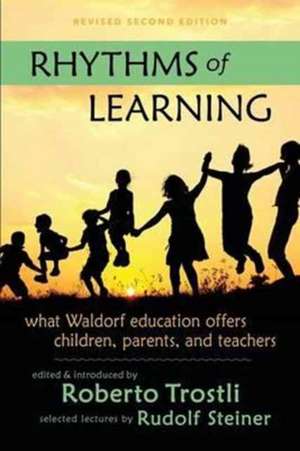Rhythms of Learning: Vista, cartea 4
Autor Rudolf Steiner, Roberto Trostlien Limba Engleză Paperback – 30 mar 2017
Waldorf education--an established and growing independent school movement--continues to be shaped and inspired by Rudolf Steiner's numerous writings and lectures on education and child development.
In Rhythms of Learning, key lectures on children and education have been thoughtfully chosen from the vast amount of material by Steiner and presented in a context that makes them reader-friendly and accessible. In his many discussions and lectures, Steiner shared his vision of education that considers the spirit, soul, and physiology in children as they grow.
Roberto Trostli, a seasoned Waldorf teacher, has selected the works that best illustrate the fundamentals of this unique approach. In each chapter, Trostli explains Steiner's concepts and describes how they work in the contemporary Waldorf classroom. We learn how the teacher-child relationship and the Waldorf school curriculum changes as the students progress from kindergarten through high school.
Rhythms of Learning is an excellent resource for parents who want to understand how their child is learning. Parents will also be more prepared to discuss their child's education with teachers, and teachers will find it to be a valuable reference source and communication tool.
Preț: 187.86 lei
Nou
35.95€ • 39.04$ • 30.20£
Carte disponibilă
Livrare economică 01-15 aprilie
Specificații
ISBN-10: 1621481794
Pagini: 366
Dimensiuni: 152 x 229 x 21 mm
Greutate: 0.54 kg
Ediția:Revised
Editura: Rudolf Steiner Press
Seria Vista














